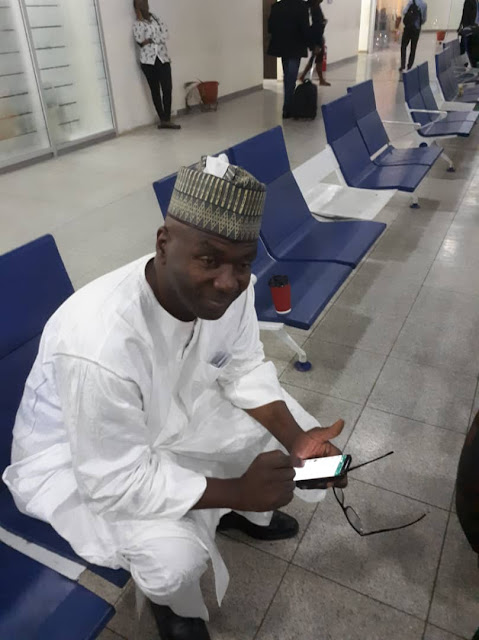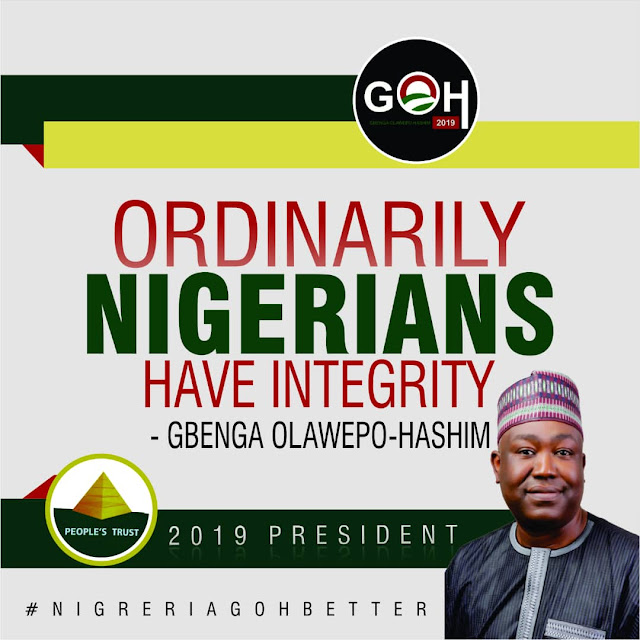Peace Structure and 2016 Strategic Conflict Assessment of Nigeria By Abdulrazaq O Hamzat
Peace does not exist on its own in an environment of interactions between two or more people. It has to be created through strategy. As I have often said, peace is a product that must be created through innovation of leaders.
Research by Institute for Economic Peace have established that the relative peace of a society is underpinned by the material and cultural circumstances of that society, whether it is the efficiency of the formal institutions of government, the strength of the economic conditions, or the strength of the cultural and informal norms that relate to corruption.
To bring peace into existence in a society like ours that is not just with multi tribal and multi religious configuration, but also with pervasive corruption and mismanagement, there is need to set up a sustainable peace structure that will continuously provide the needed antidote against conflict.
Experts are no longer in doubt that building structure for peace is the best way to address conflict. However, to build an effective structure for peace, there is need to understand the nature of conflicts prevalent in the society. This would help us build an appropriate structure that has capacity to respond and address conflict.
In an effort to understand the nature and motivation behind the numerous conflicts in Nigeria, the Institute for Peace and Conflict Resolution (IPCR) embarked on a painstaking investigation around the country to develop a Strategic Conflict Assessment (SCA) for Nigeria. They have done a wonderful job and deserve our commendation.
Although, Foundation for Peace Professionals was not involved in the process of investigation, assessment and development of the Strategic Conflict Assessment (SCA), not withstanding, we understand the vision behind the national assignment and have confidence in the outcome of the research.
On Thursday, 9th November 2017, Institute for Peace and Conflict Resolution (IPCR) launched the Strategic Conflict Assessment (SCA) for Nigeria at the Nicon Luxury Hotel here in Abuja, the Federal Capital of Nigeria. In attendance were the Minister of Foreign Affairs, Hon. Khadijat Abba, Gen. TY Danjuma, representative of UNDP, DFID and many others. I represented the Foundation for Peace Professionals (FPP).
The research presentation was the outcome of almost 2 years of vigorous efforts of investigation, consistent traveling from one local governments to the other as well as analysis of information by the institute and its consulting partners.
The Strategic Conflict Assessment (2016) was accompanied with a National Action Plan (NAP) to ensure proper implementation of the recommendations of the assessment, not just to mitigate the outbreak of conflict all across Nigeria, but to understand and address the root causes as well as find lasting solution.
We understand that the Strategic Conflict Assessment of 2016 is not the first of its kind. Similar documents had been published in 2002, 2008 and 2012 (SCA). However, the 2016 publication is different in the sense that, it came with a national action plan for the implementation.
The National Action Plan (NAP), according to the institute is to provide a framework for the implementation of the recommendation. What is required now is to set up an implementation committee to develop a strategic action plan with timeline of implementation. I want to believe that the federal government of Nigeria will mobilize the state governors and other arms of government to quickly look into the formation of a strategic action plan to come up with a timeline.
While it is true that i am yet to fully study the 548 pages document, which i am going to start doing as soon as possible along with our team at the FPP. I must note however that, i have read, studied and comprehended the 38 pages National Action Plan (NAP) and i have no doubt whatsoever that there are some worthy recommendations that may truly help the country reduce the many avoidable conflicts in Nigeria.
One of the key findings of this investigation is that, occurrences of conflicts in the 6 geo political zones of Nigeria have known no territorial or geo-political bounds. Those conflicts ranges from insurgency, militancy as well as a variety of other cross-cutting forms of inter group and communal conflicts, including conflicts borne out of youth restiveness, sundry crimes against humanity, political conflicts, ethno-religious and inter-faith, intra faith conflict and others.
To solve some of the problems identified, the SCA recommended that government define explicitly and address the issue of land use and grazing activities in Nigeria. It also recommended that constitutional amendments should clarify indigenes, citizens and settler’s rights and other far reaching recommendations.
The SCA recommendation also identified both state and non state actors that should be part of the implementation committee. For the state actors, we have the president, vice president, chief executive offices of the states, deputy governors and legislative arm of government, both at the national and state level. We also have the national and state Security Council and federal and state security and other related agencies.
As for the non state actors, this include community based organizations, faith based organizations, relevant Non Governmental Organizations, relevant International NGO’s and others. It is my view that, the combination of state and none state actors that may be part of this implementation committee as recommended by the Strategic Conflict Assessment (SCA) are the primary structures of peace needed to support peace building in Nigeria. However, how properly the structure is empowered and utilized will determine, to a large extent, its effectiveness in fulfilling it’s mandate.
Finally, the Foundation for Peace Professionals shall be reviewing the Strategic Conflict Assessment (SCA) document, after which we shall send our observation and recommendations. Meanwhile, a brief glance at the document indicates that analyses of conflict were done on regional basis. We shall also be making our reviews on regional basis. It is our intention to break down the academic jargon contained in the huge document to something more youth friendly.
Abdulrazaq O Hamzat is the Executive Director of Foundation for Peace Professionals and can be reached on discus4now@gmail.com






Comments
Post a Comment